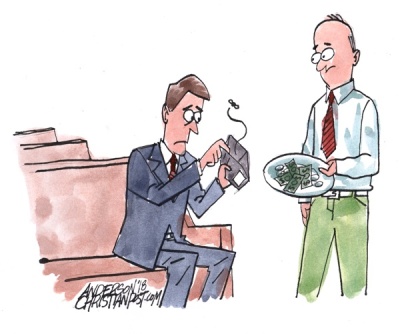3 questions to check if you are a faithful steward

Generosity is a beautiful word, isn’t it? It rolls off the tongue and conjures up images of joyful, extravagant giving and receiving.
Stewardship, on the other hand, sounds heavier and more serious to many people—like an obligation and strict limits on spending.
Why? Because Christians and many other groups have historically described stewardship in those narrow terms. But biblical stewardship is a beautiful thing because it’s an amazing privilege that God has given to us.
In God’s economy, good stewardship is by nature generous and joyful. It directs His resources extravagantly toward His purposes and for His people to deeply enjoy. If we want to understand generosity biblically, we need to see stewardship through new lenses—less as a reluctant obligation and more as an exciting opportunity.
As a pastor for over thirty years, I’ve had scores of conversations with sincere Christians who can’t understand why they’re experiencing so little of God’s power and seeing so little happen in their lives. When I ask a few questions, I usually discover they have never connected the dots between their use of money and God’s activity and blessing in their lives and significant relationships.
So I tell them that there’s a better, smarter way to live . . . an idea so simple, it’s genius. It’s a generous life of stewardship.
Faithful stewards are mindful of the one they represent. Not only are they good managers of their master’s money and resources, they know who their master is. Good stewards learn how to direct their master’s resources entrusted to them. Like me, learning what made John’s spirits soar, we can learn what brings exceeding joy to Christ.
To be the kind of stewards who are insightful managers growing in an understanding of God’s generosity and learning to be generous like Him, we need to ask ourselves three questions regularly:
1. Am I using everything entrusted to me in accordance with the owner’s wishes?
When you look at your checking account, your bank statements, your investments, and everything else in your financial profile, do you see a clear direction toward fulfilling God’s purposes and his agenda? Or do you see them focused on fulfilling your own agenda?
When you look at how you approach your customers, your employees, and your vendors, are you treating them as objects under your control or as people under God’s umbrella of grace and love?
God has a plan and purpose for every man, woman, and child. We can see some clear themes in Scripture.
One is the Great Commission. God is concerned about every lost person on this planet. He wants them to hear the Gospel and come to know Jesus personally. If your energy is going toward reaching lost people, it’s going toward his purposes.
A second key purpose is building up the body of Christ, the Church. God wants every believer to grow to spiritual maturity and to fulfill their purpose in Him. When we work toward that end, we are using His resources for His purposes.
Third, God is passionate about people who are hurting and desperate. He is compassionate toward those in need. If we put our resources into acts of compassion and justice for those who have deep physical, emotional, and spiritual needs, our giving is aligned with His purposes.
We can know we are being trustworthy in fulfilling God’s wishes when we are putting His resources toward these things.
2. Am I carefully keeping an account of where the owner’s goods are going?
Whether we’re giving God 10 percent or 50 percent, whatever’s left after our offering is still His. We’re just as accountable for how we spend the remaining 90 percent or the remaining 50 percent as we are for giving Him the first and best to start with. This applies not only to money but to our time and talent as well.
To do that, we have to keep track of where everything is being spent. Think of it like a budget. One of the clearest pieces of evidence that we are serious about being good money managers is that we live on at least some semblance of a budget. It’s impossible to be a good steward of someone else’s money if we haven’t determined where it will go and tracked it along the way.
The majority of people don’t live on a budget. We pay the bills and then spend the rest somewhat randomly or without clear intentions.
When we view ourselves as owners, it’s easy to be careless or selfish with what God has entrusted to us. Instead, we need to understand the business God has given us, the people God has put under us, and the customers he has brought to us to serve and view all of those things as “budget items” for which we are accountable.
Where are you spending most of your time and energy? Where are you spending most of your money? Who do these efforts and expenditures benefit?
These are hard questions to ask, but they’ll at least get you started down a path of understanding whether you truly view yourself as an owner or a steward, and they’ll guide you closer to becoming the latter.
3. Am I becoming best friends with the owner while managing his resources?
Though a lot of faithful stewardship involves sacrifice, don’t let that overshadow the joy of fulfilling your Father’s wishes and celebrating your fruitfulness with him. There’s nothing legalistic in the kind of stewardship we’re talking about. We’re becoming faithful stewards because we want to, not simply because we have a duty or we want God to love us more. He’ll never love us more than He loves us right now.
My relationship with John only deepened over the time we spent working together. We went from acquaintances who saw each other once a month to coworkers and friends who were challenging each other to see how God could move in and through us. Meeting together to talk through how I was stewarding His money was never a task to accomplish. It was a joy. It was exhilarating.
Generous giving and faithful stewardship create an opportunity for us to enjoy God’s blessing and delight. That’s part of the genius of generosity: it deepens our relationship with Him. Have a few extravagant lunches with Him to celebrate what you and He have done together with His resources.
“The earth is the Lord’s, and everything in it,” says God’s Word (Psalm 24:1), and He loves it when we celebrate with Him, while feeling guilt-free. Stewardship is not about depriving yourself. It’s enjoying God’s generosity for yourself and then sharing it with others. It’s living under the gaze of an infinite being who loves you and says, “First and foremost, give it and spend it in a way that’s pleasing to me and that acknowledges I own it all. Manage it well. Then, let’s celebrate. Let’s rejoice. I am your Father. I love you. Every good and perfect gift comes from my hand to bless and encourage you. Let me delight over you and your faithfulness.”
That’s what stewardship is about.
Your life will be drastically transformed when you realize, deep down, that everything belongs to God, and He trusts you to use it well.
Wake up every day asking, “Lord, what do you want me to do with this time, talent, and treasure You’ve given me? What would make You happiest and give me the most bang for my buck spiritually? What can I do to become better friends with You through this process? How do I get to the place where we can have extravagant lunches and celebrate Your goodness, and where I can feel Your pleasure over me?”
Thinking like a faithful and generous steward will produce great joy and fruitfulness in your life. Enjoy God’s generosity to you, then share it with others so you can all enjoy Him together.
Adapted from Faith-Driven Entrepreneur: What It Takes to Step Into Your Purpose and Pursue Your God-Given Call to Create by Henry Kaestner, J. D. Greear, and Chip Ingram. Copyright ©2021. Used by permission of Tyndale House Publishers, a Division of Tyndale House Ministries. All rights reserved.




























